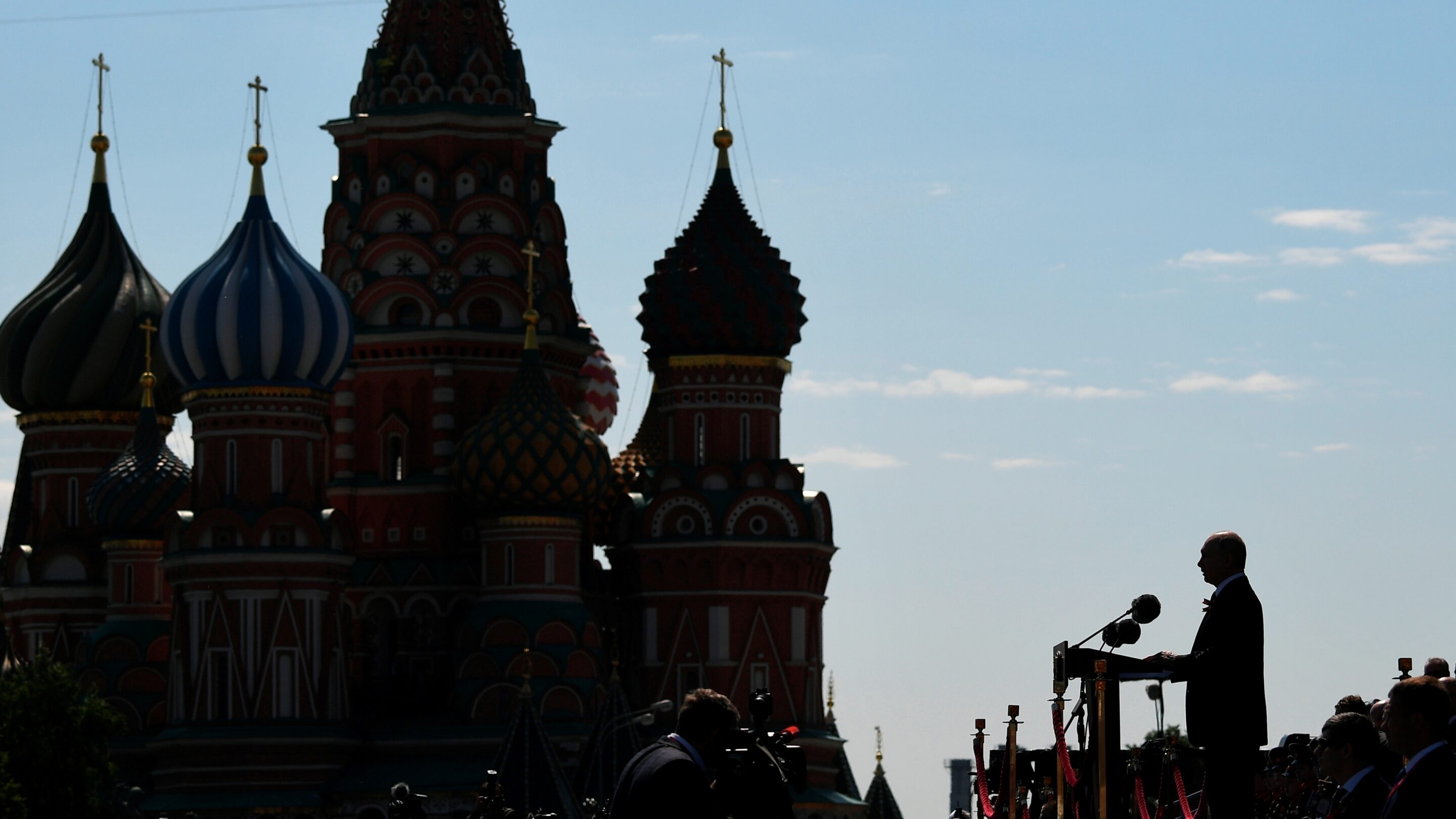Many Russians dream of a democratic future. But an onslaught of propaganda shields Vladimir Putin from opponents and obscures the truth.

Russian President Vladimir Putin delivers a speech during the Victory Day military parade marking the 75th anniversary of the Nazi defeat in Moscow, Russia, 24 June 2020. (Ramil Sitdikov, Sputnik, Kremlin Pool Photo via AP)
Russian dissident Alexei Navalny, asked to imagine what message he’d leave Russians in the event of his death, stares straight into the camera.
“The only thing necessary for the triumph of evil is for good people to do nothing,” the now jailed Kremlin critic tells Canadian filmmaker Daniel Boher in a new documentary for CNN Films. “So, you mustn’t do nothing.”
The prospect Boher poses of Navalny’s assassination is not far-fetched. Navalny survived an attempt to poison him with a nerve agent in 2020, was evacuated for medical treatment to Germany and later returned to Russia knowing he’d go straight to jail.
The likelihood of an uprising against Russian President Vladimir Putin and his allies, on the other hand, seems less likely. A daily onslaught of propaganda helps explain why.
Navalny’s rhetorical appeal to Russians to take action might resonate among the opposition figure’s 2.3 million Twitter followers.
But what about the many Russians who believe the claim, repeated over and over by Russian politicians and media, that Moscow is striving to free its helpless neighbors from Nazis? Or those who disbelieve reports of bombs falling from the sky, even when the reports come from their own family members?
‘Quite honestly, I think Russia is doomed.’
The Russians whom I know dream of a democratic, market-oriented leader taking Putin’s place. For them, the killing, raping and maiming of Ukrainian civilians is a brutal catastrophe. As cities, towns and villages are obliterated, they reflect on another reality.
“Quite honestly, I think Russia is doomed,” one friend told me recently. “The question is when, and how.”
I started studying and spending time in places where Russian is spoken in 1989. This friend is one of many educated Russians I have known for years. I am not using my friend’s name because I don’t want him to go to jail for criticizing the war in Ukraine.
This friend is also old enough to remember the Soviet period and has reasons to miss it, just as Putin evidently does. But, unlike Putin, he laments what he sees as the way propaganda has been used to convince many Russians into believing Putin has their best interests at heart.
Propaganda has a clear field now that new censorship rules have shuttered many media outlets. One such outlet was Dozhd TV station, whose founder, Natalia Sindeeva, described, in an interview with The Independent newspaper last month, how Putin silences critics.
She said the roughly 20% of the population opposed to Putin have ways to find out what is going on in Ukraine, using virtual private networks, but the rest are absorbed by state messaging claiming Ukrainians are bombing and killing themselves.
“We cannot reach them, and, to be honest, they do not have any demand for independent information. It is a majority of the people – they support the war, they support Putin, they make it easier for him,” The Independent quoted her as saying.
Like other media, Dozhd was forced to shut down after a law was passed imposing up to 15 years imprisonment for “fake” information about the war.
‘We have this horrible combination of propaganda and real resentment.’
For my friend, there are two big reasons Russians believe Putin and his allies. Under Putin, state television has fed audiences a diet of crass entertainment. Audiences have been primed for the current diet of misrepresentations of what is happening in Ukraine.
Second, millions of Russians have left the country, leaving what my friend called an intellectual deficit that has grown in layers over generations of war and political upheaval. “We have this horrible combination of propaganda and real resentment,” he said.
Many Russians believe Putin’s propaganda that the war in Ukraine is a “special operation” and not an invasion by a country that still considers itself a superpower. They see no evidence of how Russian forces are faltering in Ukraine. “We thought Russia was a military superpower, but it turns out even that is not true — because of corruption, mostly,” my friend said.
For my friend, there is a clear contrast with the latter part of the Soviet period, when Russians were inured to Kremlin propaganda about “elections” that weren’t really elections, and so on. “They were either indifferent or didn’t believe it.”
My friend attributes Putin’s propagandist success in part to the size of the budget granted to Kremlin-backed media and the style with which government ministries, notably that of Defense Minister Sergei Shoigu, speak. “They lie all the time, but they are lying so enthusiastically that quite a lot of people believe it.”
Dozhd TV founder Sindeeva is pessimistic that the West’s expanding sanctions against Russia will turn people away from Putin.
“Russians might even become more united against this outside enemy,” she told The Independent.
Questions to consider:
- What do you think about Alexei Navalny and his anti-corruption campaign? Do you think he stands a chance of ever being elected president in Russia?
- Can you think of examples of propaganda you have seen?
- What do you think you might do if you were in Russia now?

Elaine Monaghan has worked for two decades in international journalism. For Reuters, she was a correspondent in Russia; chief correspondent in Ukraine and Belarus, and in Ireland and Northern Ireland; and U.S. State Department correspondent in Washington. She joined The Times in 2002 as Washington correspondent before moving to the Congressional Quarterly. Currently she is professor of practice at Indiana University’s Media School and serves as a freelance editor for Reuters.

Very good piece.